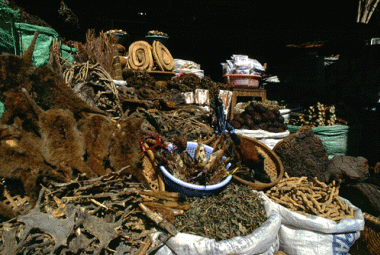Dr. Aina Oluwagbemiga, a medical researcher at the Nigerian Institute of Medical Research in Yaba, Lagos, claimed that the organization had yet to come across any herbal remedies for malaria in the nation.
The herbal remedies currently available, according to Dr. Aina, Deputy Director of Research at the NIMR’s Centre for Research in Traditional, Complementary and Alternative Medicine’s Biochemistry and Nutrition Department, can only suppress the parasite; they ca
The deputy director, who has over 25 years of experience in malaria research, claimed that despite numerous claims made by their producers, the majority of herbal remedies used to treat malaria in the nation lack evidence of their usefulness.
In an exclusive interview with Propolitics Healthwise, Dr. Aina made this disclosure.
Before receiving treatment, he asked Nigerians to get tested and confirm that they had malaria.
Anopheles mosquitoes of the genus Anopheles carry the plasmodium parasite, which causes malaria. The severity of the sickness depends on the species of the parasite.
Antimalarial medications are used to treat the chills, fever, and sweating that typically appear a few weeks after being bitten.
Malaria is a disease that can be prevented and treated, according to the World Health Organization, but it nevertheless has a terrible effect on people’s health and way of life all over the world.
The researcher mentioned that over 50 herbal remedies for the treatment of malaria had been studied by NIMR over the course of the previous two years, but none of them had been able to support the producers’ claims that they could cure malaria.
“NIMR has yet to see any herbal remedy that treats malaria, we have yet to see,” he said. For the time being, nobody has seen us. In my personal experience, there are no herbal remedies for treating malaria.
“What they do is just to lower the body temperature and the parasites will just be suppressed but after some time, they will come back. I have not seen anyone that cures it like chloroquine does.
“We are still looking for them. Although some people have been claiming that they cure malaria, I have yet to see anyone and I have told them to bring their products and let’s try them and see whether it is going to work.
“We believe that our herbal products do work in certain areas and we know that we cannot stop people from taking herbal products.”
He claimed that’s why Prof. Babatunde Salako, Director General of NIMR, founded the Institute’s Centre for Research in Traditional, Complementary and Alternative Medicine to validate those claims by putting them through clinical testing to determine their efficacy and safety.
“He said that we should look at their claims and let us see if the herbal products are safe for consumption. That is why we normally call them to bring their products, let’s do a safety profile on you and let us be sure that it is even safe for consumption.
“So after we have done the test and it is good for consumption, then you do an efficacy study, what you claimed that this your product does, does it do?
“That’s when we now go into an efficacy study. But as I said for malaria, I am yet to see any herbal product that cures malaria”, he said.
Dr. Aina said that since many illnesses and conditions have symptoms that resemble malaria, patients should get tested to determine if they have the disease rather than assuming they do.
“You must first perform a test,” he said, “for you to know that you have malaria. View the parasite that causes malaria there. Take your herbal product as soon as the test is finished.
“After a day or two, we do another test to see whether the parasite has cleared or not. That is how to do an efficacy study and that is what we do with this our orthodox medicine, Artemisinin-based Combination Therapy to see whether it is still effective or not.
“As for herbal products, a lot of people claim that it does this, it does that but we are yet to see one that cures the malaria parasite.
“From my 25 years of experience working with malaria and using herbal products, I have not seen anyone that cured the parasite.
“I have tested more than 50 herbal products in the last two years but I have not seen anyone that can cure the parasite.
“All the products that we have seen so far, they only suppress malaria but they don’t cure. After some time, the parasite will still come out and the person will have these symptoms that he has malaria.”
He advised Nigerians to treat malaria using recognized treatments.
The researcher provided advice. “Many people mistakenly believe they have malaria when they don’t. Many diseases have symptoms that resemble malaria.
“If we have symptoms of malaria, we must do a test and do it in a recognised facility.”
According to the WHO’s 2020 World Malaria Report, Nigeria had the highest percentage of malaria cases worldwide (27% of all cases) and deaths worldwide (23% of all malaria deaths worldwide) in 2019.
Researchers found that due to their extensive use, medicinal herbs play a substantial role in lessening the severity of malaria, according to a 2022 study published in the BioMed Central Malaria Journal.
They claimed that additional research was required to find and create efficient innovative medications that could be used in more extensive malaria eradication initiatives.






